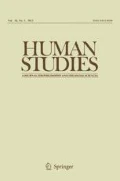Abstract
This paper develops a new interpretation of Heidegger's concept of conscience in order to show to what extent his thought establishes the possibility of civil disobedience. The origin of conscience lies in the self's appropriation of language as inviting a reciprocal response of the other (person). By developing the social dimension of dialogue, it is showsn that conscience reveals the self in its capacity for dissent, free speech, and civil disobedience. By developing the social roots of conscience, a completely new light is cast on the political implications of Heidegger's thought.
Similar content being viewed by others
References
Adorno, T. (1993). Hegel: Three Studies. Cambridge: MIT.
Arendt, H. (1978). The Life of the Mind, Vol. II.New York: Harcourt, Brace, Jovanovich.
Bernasconi, R. (1995). On Heidegger's Other Sins of Omission. American Catholic Philosophical QuarterlyXLIX: 333-374.
Birmingham, P. (1990) Logosand the Place of the Other. Research in Phenomenology.
Dahlstrom, D. The Dialectic of Conscience and the Necessity ofMorality in Hegel's Philosophy of Right. The Owl of Minerva 24(2): 185-192.
Gadamer, H.G. (1989). Truth and Method. Trans. J. Weinsheimer and D. Marshall. New York: Crossroads.
Haar, M. (1992). Heidegger and the Essence ofMan. W. McNeil. Albany, N.Y.: State University of New York Press.
Hegel, G.F.W. (1977). Phenomenology of Spirit. Trans. A.V. Miller. Oxford: Oxford University.
Hegel, G.F.W. (1979) System of Ethical Life and First Philosophy of Spirit. Trans. H.S. Harris and T.M. Knox. Albany, NY: State University of New York Press.
Heidegger, M. (1956). What Is Philosophy?Trans. J.T. Wilde and W. Kluback. New Haven: College and University Press.
Heidegger, M. (1958). The Question of Being. Trans. J.T. Wilde and W. Kluback. New Haven: College and University Press.
Heidegger, M. (1959). An Introduction to Metaphysics. Trans. R. Manheim. New Haven: Yale University.
Heidegger, M. (1962). Being and Time. New York: Harper & Row.
Heidegger, M. (1969a). The Essence of Reasons. Trans. T. Malick. Evanston: Northwestern University.
Heidegger, M. (1969b). Identity and Difference. Trans. J. Stambaugh. New York: Harper Row.
Heidegger, M. (1969c). On the Way to Language. Trans. J. Stambaugh and P. Herz. New York: Harper & Row.
Heidegger, M. (1971). Poetry, Language, Thought. Trans. A. Hofstader. New York: Harper & Row.
Heidegger, M. (1977). On the Essence of Truth. In D.F. Krell (Ed.), Basic Writings. New York: Harper & Row.
Heidegger, M. (1982). Vom Wesen der menschlichen Freiheit. Frankfurt am Main: Vittorio Klostermann.
Heidegger, M. (1985). Schelling's Treatise on the Essence of Human Freedom. Trans. J. Stambaugh. Athens, Ohio: Ohio University.
Heidegger, M. (1988a). Hegel's Phemonenology of Spirit. P. Emad and K. Maly. Bloomington: Indiana University.
Heidegger, M. (1988b). Ontologie: Hermeneutik der Faktizität. Frankfurt am Main: Vittorio Klostermann.
Hodge, J. (1995). Heidegger and Ethics. London: Routledge.
Horton, J. (1992). Political Obligation. Atlantic Highlands, N.J.: Humanities Press International.
King, M.L., Jr. (1993) Letter from a Birmingham Jail. In J. Feinberg (Ed.), Reason and Responsibility.
Kisiel, T. (1993). The Genesis of Heidegger's Being and Time. Berkeley: University of California.
McCumber, J. (1984). Authenticity and Interaction: The Account of Communication in Being and Time. Tulane Studies in Philosophy 33: 45-52.
Polt, R. (1995). Heidegger's Topical Hermeneutics. Journal of the British Society for Phenomenology 27(1): 53-76.
Rawls, J. (1993). Civil Disobedience. In J. Arthur (Ed.), Morality and Moral Controversies. New York: Prentice Hall.
Ricoeur, P. (1992). Oneself as Another. Chicago: The University of Chicago.
Schalow, F. (1977). Heidegger on Free Speech. Philosophical Writings 1(4): 26-36.
Schmidt, D (1988). The Ubiquity of the Finite. Cambridge: MIT.
Schürmann, R. (1987). Heidegger on Being and Acting. Trans. C. Gros. Bloomington: Indiana University.
Sherover, C. M. (1989). Time, Freedom, and the Common Good. Albany, N.Y.: State University of New York Press.
Sluga, H. (1993). Heidegger's Crisis. Harvard: Harvard University.
Taylor, C. (1993). Multiculturalism and the Politics of Recognition. Princeton: Princeton University.
Thiele, L.P. (1995). Timely Mediations: Martin Heidegger and Postmodern Politics. Princeton: Princeton University.
Watson, S. (1996). Interpretation, Dialogue, and Friendship. Research in Phenomenology 26: 54-97.
Rights and permissions
About this article
Cite this article
Schalow, F. Language and the Social Roots of Conscience: Heidegger's Less Traveled Path. Human Studies 21, 141–156 (1998). https://doi.org/10.1023/A:1005312105548
Issue Date:
DOI: https://doi.org/10.1023/A:1005312105548




